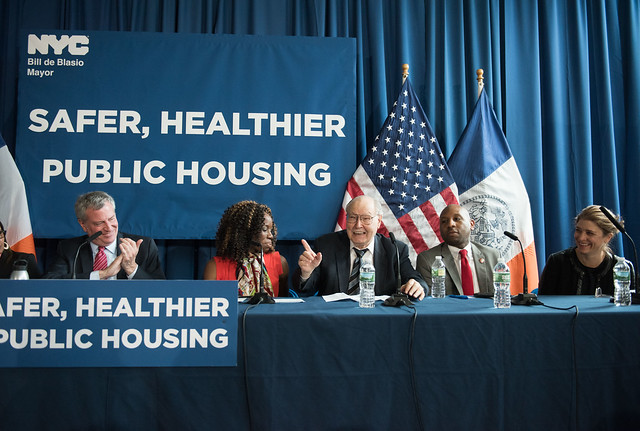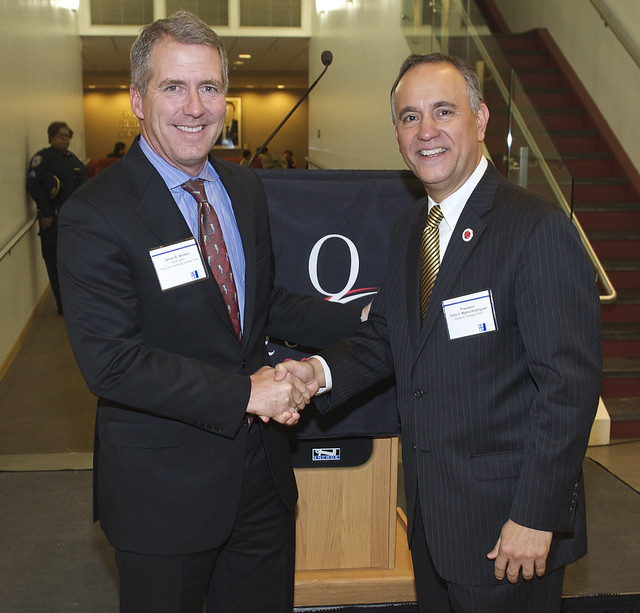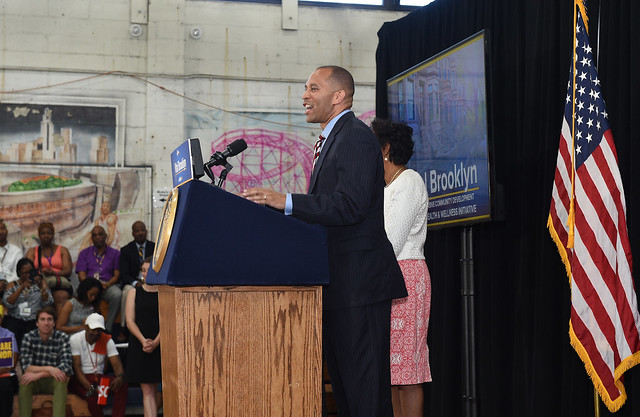A Lion of City Government Issues a Warning

Stan Brezenoff, middle (photo: Michael Appleton/Mayoral Photography Office)
The dramatic growth in the size and cost of city government since Mayor de Blasio took office has been of concern to budget watchdogs: the number of city employees has grown by 35,000 and total annual spending by more than $20 billion since 2014.
The mayor’s latest budget presentation, delivered last week, came with talk of fiscal prudence, but assuaged few fears, including those of an unexpected new source adding his voice to those warning about the city’s long-term health.
The $92.5 billion proposed operating budget for the fiscal year that will begin on July 1 includes over $1 billion more in city-funded expenditures than was anticipated by the mayor’s Preliminary Budget released only a few months ago, offset by increases in revenue and “savings” through a variety of expenditure adjustments, netting out to an increase of about $350 million in planned spending since the mayor’s prior plan.
The budget for the coming fiscal year is balanced but the projected deficit for the 2020-2021 fiscal year is estimated to be $3.5 billion. The revised 10-year Capital Strategy is increasing a whopping $13 billion -- to nearly $117 billion.
The mayor stressed that his plan is fiscally prudent and that new initiatives have been kept to a minimum out of an abundance of caution about possible threats to the city’s economic picture. But Citizens Budget Commission President Andrew Rein succinctly summarized the general reaction from watchdogs and other commenters:
“Mayor de Blasio’s stay-the-course budget does not take the steps needed to preserve services or forestall tax increases in the eventual hard times.”
Will our city’s elected leaders heed the warnings and restrain their impulse to find more “savings” and add more spending to the budget that is finally adopted by the end of June? Not if past behavior is any guide.
But perhaps they will listen to someone who should command respect from the mayor and City Council alike: Stanley Brezenoff.
Last Friday, the day after the mayor presented his updated budget plans, Stan received the Civic Fame Award from the Center for New York City Law at New York Law School. his remarks were reflections about his years in government and the nature of the three mayoral administrations he has served. They were thoughtful, nuanced, and unexpected.
Stan started out as a young activist in the civil rights movement working for the Reverend Milton Galamison, who led the fight for community control of city schools in the 1960s. Indeed, it was noted at the award ceremony that Stan had some trouble getting a full-time job in New York because he had so many arrests from protests on his record.
Stan entered city government in the administration of Mayor John Lindsay, went on to various positions including as the first commissioner of the newly formed Human Resources Administration, was Executive Director of the Port Authority, and eventually became First Deputy Mayor under Ed Koch, which is when I first met and worked for/with him.
I was fortunate to work with Stan again when he was the Vice Chair and I was President of the September 11th Fund, and since then we have been friends and colleagues on various projects.
Given Stan’s extensive background and his long relationship with then-First Deputy Mayor Tony Shorris (who was his deputy and successor at the Port Authority), it is not surprising that Mayor de Blasio has relied on Stan to help deal with some of the weightiest challenges of his administration – first as an advisor on labor relations, then as Acting CEO of the city’s financially-strapped Health + Hospital system (which he ran 1981-1984), and most recently as Acting Chair of the beleaguered public housing authority, NYCHA.
So, suffice it to say, this is not someone who can be dismissed as a conservative, anti-government pundit who doesn’t care about the city’s social safety net or believe in unionized public employment. That is why his comments, while diplomatic, were especially noteworthy and startling.
His main points were:
-Mayor Lindsay came into office in 1966 at an important inflection point. He had an expansionist, activist agenda driven by social goals, i.e. equality and attention to the needs of the poor.
-Lindsay attracted a young, energetic staff that shared his agenda and they accomplished a great deal.
-But they were not prepared or oriented towards the tasks needed to manage the large business enterprise that is city government; hence the seeds of the fiscal crisis were sown.
-Mayor Abe Beame (1974-1977) and his administration lacked the understanding and tools to address the magnitude of the financial challenges that became apparent. Capital funding had been borrowed and used to support operating expenses and now the banks were refusing to loan the city government any more money.
-Mayor Ed Koch (1978-1989) brought a management perspective to the job. Because of the fiscal crisis the public psyche had changed and it became “easier to say no” to advocates and new social policies because there simply wasn’t enough money to do everything. Koch and his administration, subject to the constraints imposed by the Emergency Financial Control Act, engineered a financial turnaround that put the city on a stable footing.
-Moving forward to the present, the current administration is experiencing an extraordinary period of affluence that has enabled Mayor de Blasio, as did Lindsay, to focus on an expansionist social agenda. While his achievements –- e.g. universal pre-kindergarten, an aggressive affordable housing program – are laudable and important, there has been less attention to enterprise management functions and there are warning signs that good times will not last much longer.
-There has been little emphasis on efficient service delivery and achieving savings. The annual PEG (Program to Eliminate the Gap) that has been required by all mayors since Koch to exert savings discipline upon agency spending has been absent 2014-2018.
-This is the first budget of the de Blasio administration in which a PEG has been imposed, but it was “not very vigorous.”
-Good stewardship requires remembering and learning from history. Expansionist policies cannot be implemented without good fiscal management to sustain them.
Thus, in a very nuanced, diplomatic way, 40-year veteran of government Stan Brezenoff offered the same message as Andrew Rein from CBC: we are taking the good times for granted and are not prepared for a recession or some terrible crisis that rapidly decreases revenue and catches the city unprepared to fund all its current expenses and significant long-term liabilities.
City Council and mayor: listen up! Stan Brezenoff has committed his life to social justice. He is not anti-union or a believer in small government. If he is worried, you should be too!
Don’t make the situation worse by adding pet projects to what the Executive Budget already includes. Any more revenue that turns up should be put into reserves for that rainy day. We are far short of the $12-15 billion that would be needed to weather a recession.
The public and Stan B will be watching.
[Watch Stan Brezenoff’s comments in full here.]
***
Carol Kellermann was president of Citizens Budget Commission from 2008 through 2018.
***
Have an op-ed idea or submission for Gotham Gazette? Email This email address is being protected from spambots. You need JavaScript enabled to view it.
The Opportunity Ahead for the New CUNY Chancellor

Former CUNY Chancellor James Milliken, left, & incoming Chancellor Felix Matos Rodriguez (photo: CUNY)
Today -- Wednesday, May 1 -- Felix Matos-Rodriguez assumes the post of CUNY chancellor following a year-long search. After successfully leading two CUNY colleges, Chancellor Matos-Rodriguez takes over an institution that has made important strides in recent years, including opening an innovative new community college and launching nationally renowned programs like CUNY ASAP.
To help grow New York City’s middle class and greatly expand economic opportunity, CUNY’s next leader will need to make boosting college and career success his highest priority.
The nation’s largest urban public university provides many thousands of New Yorkers from low-income backgrounds with an education that can make the difference between persistent economic struggle and transformative economic and social mobility.
But CUNY still has work to do. Too many students drop out without a credential; graduates do not always end up on the path to career success; curriculum development can lag behind the city’s fast-changing economy; and CUNY sometimes struggles to tune in to the needs of employers.
There’s no time to lose. Today nearly 3.4 million New Yorkers age 25 and older lack any sort of post-secondary credential, exacerbating the city’s opportunity divide. While nearly 61% of Manhattan residents hold a bachelor’s degree or higher, the same is true for just 19% of those in the Bronx.
For residents without a college credential, far too many of the city’s growing, well-paying occupations -- from software developer to registered nurse -- remain out of reach.
Narrowing that divide depends on CUNY.
There’s no institution better positioned to help lower-income and first-generation students earn a post-secondary credential -- and with it, the opportunity to participate in and shape the economy of the future. But despite recent progress, only 22% of students who enter CUNY's community colleges graduate in three years. At CUNY’s senior colleges, just 55% earn a degree in six years. Getting more New Yorkers on the path to economic opportunity will require a major effort to increase the number of students who graduate with a degree.
The new chancellor’s first goal should be to dramatically improve those figures. Fortunately, CUNY has at least two programs proven to significantly boost completion rates: CUNY ASAP and CUNY Start.
ASAP provides a set of integrated supports to community college students, including free MetroCards and intensive academic counseling. Start is a bootcamp program that significantly boosts academic readiness for underprepared students without burning through their financial aid. Both programs should be made available to all community college students, and a version of ASAP should expand to senior colleges, too.
While it’s true that most community college students enter the classroom struggling with at least one core subject, traditional remedial programs just don’t work. Students in these programs are far more likely to drop out, even though research shows that most can succeed with a little help.
Chancellor Matos-Rodriguez should champion a system-wide effort to move away from traditional remedial education in favor of highly effective alternatives like the corequisite model, which allows students to pursue credit-bearing courses from day one with extra support.
But the challenge for the next chancellor doesn’t end at graduation day. CUNY lacks a strategy to ensure that a CUNY credential leads to career success.
The next chancellor should lead a major effort to engage employers around every campus and develop industry-informed curricula tailored to growing occupations in tech, hospitality, creative industries, healthcare, construction, and beyond.
This will require CUNY to quicken the pace of development for new programs and courses and speed up technology procurement -- and New York City and State should support these efforts with more funding for employer engagement and a faster approvals process for new programs. Additional goals should include launching new apprenticeship programs with industry partners, expanding the number of internships and work-study opportunities available to CUNY students, and pushing to increase and improve career counseling services.
CUNY should also take steps to develop new certificate programs -- designed in partnership with employers, unions, or trade associations -- that can provide community college students with a marketable credential that counts toward a two- or four-year degree.
Doing all this will require sustained and expanded support from New York City and State. But it will also depend on strong and creative leadership at a decisive moment for public higher education. The new chancellor should ensure that CUNY’s faculty, administrators, and curricula have the flexibility to move at the speed of technology and a clear mandate to prepare students for the jobs -- and opportunities -- of the future.
By focusing his administration on elevating college and career success, Chancellor Matos-Rodriguez can help the nation’s largest urban university become its most effective launchpad to the middle class.
***
Jonathan Bowles is executive director of the Center for an Urban Future, a New York City–based think tank focused on expanding economic opportunity. Winston C. Fisher is partner at Fisher Brothers and co-chair of the New York City Regional Economic Development Council. On Twitter @jbowlesNYC & @Wnston_Fisher1 & @nycfuture.
***
Have an op-ed idea or submission for Gotham Gazette? Email This email address is being protected from spambots. You need JavaScript enabled to view it.
Why is Rep. Hakeem Jeffries MIA on the Green New Deal?

Rep. Hakeem Jeffries (photo: Kevin Coughlin/Office of Governor Andrew M. Cuomo)
The Green New Deal resolution has garnered a lot of attention since it was introduced in February. The nonbinding resolution, sponsored by Rep. Alexandria Ocasio-Cortez (D-NY) and Senator Edward J. Markey (D-MA), aims to reshape our energy system and economy by committing to a swift and just transition to 100% clean renewable energy.
Such a bold transformation is exactly what is needed according to the International Panel on Climate Change (IPCC) in order to avoid the worst effects of climate change. After all, the IPCC explained that we only have twelve years to get our emissions under control or else we will be locked in to climate catastrophe.
The Green New Deal promises not only to get us off fossil fuels, but will also create millions of good jobs retrofitting existing buildings so they are more energy-efficient and boosting wind and solar energy investments. The resolution also aims to protect frontline communities and those most affected by climate change and pollution.
The Green New Deal has attracted considerable support in a rapid time, receiving endorsements from nearly all Democratic contenders for the presidency and having over 90 co-sponsors in the House of Representatives. According to a Business Insider poll, over 80% of respondents support almost all of the components of the Green New Deal resolution. Of course, the resolution has garnered its critics too, with President Trump referring to it as “socialism.”
Nearly all of the congressional representatives from New York City signed on as co-sponsors to Rep. Ocasio-Cortez’ resolution. However, there remains a glaring omission in Rep. Hakeem Jeffries (D-NY). Rep. Jeffries represents a solidly blue district in Brooklyn and Southwest Queens which has already witnessed the devastating effects of climate change firsthand with Hurricane Sandy wreaking havoc along the Brooklyn-Queens waterfront. In fact, his 8th congressional district received more aid for Hurricane Sandy relief than any other district in the city.
While there is wide support for the resolution, the Democratic leadership in Congress remains disinterested in moving forward, exemplified when House Speaker Pelosi laughed off the resolution by calling it the “green dream.” Likewise, Mitch McConnell’s stunt vote in the Senate failed to garner a single Democratic vote. The Democratic Party leadership in Congress, including Rep. Jeffries, should demonstrate that they are committed to tackling climate change head-on by supporting the Green New Deal.
Rep. Jeffries is certainly a major player and rising star within the Democratic Party, as he was elected chair of the House Democratic Caucus, and is rumored to be on the fast-track to be Speaker of the House. Interestingly, Rep. Jeffries owes his current leadership position in part to Rep. Alexandria Ocasio-Cortez, who ousted the previous chair of the caucus, Rep. Joseph Crowley, in a primary.
Rep. Jeffries should prove his progressive bonafides by supporting the Green New Deal. Indeed, it may be bad politics for him to avoid the resolution; he wouldn’t want the same fate of Rep. Crowley by being primaried from the left.
As it currently stands, Rep. Jeffries and freshman Rep. Max Rose (D-NY) are the sole New York City members of Congress to fail to sign on to the Green New Deal. Rose represents another area massively affected by climate change and Hurricane Sandy -- Staten Island and Southern Brooklyn. However, Rep. Rose’s district is hardly safely Democratic, and he does not need to fear a primary challenger from the left.
To be sure, the Green New Deal is only a nonbinding resolution and doesn’t actually enact any measures that will reduce greenhouse gas emissions. Rather it sets the vision and the goals to massively transition the economy away from its reliance on fossil fuels.
Rep. Jeffries has indicated that rather than signing on to the Green New Deal, he is inclined to wait until the bipartisan “House Select Committee on the Climate Crisis” makes recommendations on the issue, a process that can take over a year. However, with climate change, time is not a renewable resource. It is essential that congressional leadership at least entertain solutions commensurate with the challenges we face. Rep. Jeffries should show the courage and leadership on the climate and support the Green New Deal.
Rep. Jeffries has a duty to his constituents to support policies that will reduce carbon emissions, create green jobs, and build up the infrastructure that protects his district from the next superstorm. After all, not only is it good politics to support the Green New Deal, but according to the world’s top scientists, it is absolutely necessary policy. To show true leadership, for his party and the country, Rep. Jeffries should champion the Green New Deal.
***
Ari R. Lieberman is an attorney and the legislative coordinator for 350Brooklyn, a grassroots climate change organization affiliated with 350.org. On Twitter @the_greenmarble.
***
Have an op-ed idea or submission for Gotham Gazette? Email This email address is being protected from spambots. You need JavaScript enabled to view it.




